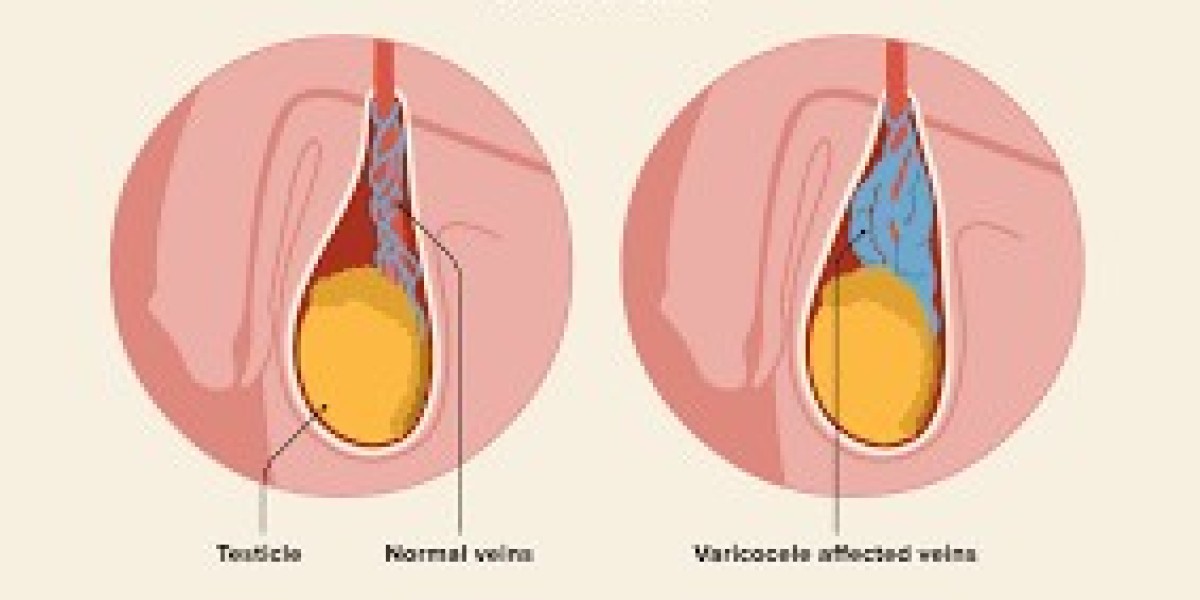Varicocele is a medical condition that affects the veins in the scrotum, leading to swelling and discomfort. While it’s often a concern for men, particularly those trying to conceive, many don’t realize that lifestyle factors like exercise, particularly intense gym workouts, can influence the condition. If you're an avid gym-goer, you might be wondering: does hitting the gym lead to varicocele? In this article, we'll explore the possible connection between physical activity and varicocele development, helping you understand how your workout routines might be affecting your health.
What is Varicocele?
Before delving into the potential link between gym workouts and varicocele, it’s important to understand the condition itself. A varicocele occurs when the veins inside the scrotum become enlarged, similar to varicose veins that develop in the legs. This happens when the valves inside the veins that prevent blood from flowing backward stop working properly. As a result, blood pools in the veins, causing them to swell.
Varicoceles are common, affecting about 15% of men, particularly between the ages of 15 and 25. While they often develop without obvious symptoms, some men may experience pain, testicular shrinkage, or fertility issues.
The Impact of Gym Workouts on Varicocele
For many people, working out is a vital part of staying healthy. But like all physical activities, exercise, especially intense gym sessions, can have both positive and negative effects on your body. When it comes to varicocele, some workouts might contribute to the development of the condition, while others could potentially aggravate it. Here's how:
1. Heavy Weightlifting
Weightlifting is a popular form of exercise in the gym. However, lifting heavy weights, especially without proper form, can put pressure on the body, including the veins in the pelvic and scrotal areas. This pressure can cause blood to back up in the veins of the scrotum, increasing the risk of developing a varicocele.
When you lift heavy weights, your intra-abdominal pressure increases, which can affect the veins in your scrotum. If the valves in these veins are already weak, the added pressure could worsen the condition or even contribute to its development.
2. Strenuous Abdominal Exercises
Exercises that target the core, such as sit-ups, crunches, or leg raises, can also impact the pressure in the abdominal region. Similar to weightlifting, these exercises increase intra-abdominal pressure, which can lead to the expansion of veins in the scrotum. For men predisposed to varicocele, intense core workouts could potentially trigger or worsen the condition.
3. Lack of Recovery Time
Intense workouts require proper recovery. Overtraining without sufficient rest can cause stress to your body, including the veins in your pelvic region. This prolonged strain can increase the likelihood of varicocele development, especially if combined with other risk factors like genetics or pre-existing vein weaknesses.
4. Dehydration and Poor Circulation
Gym-goers often push themselves to the limit, sometimes neglecting basic hydration and nutrition. Dehydration can cause the blood to become thicker and more prone to clotting, which can affect blood flow. When combined with intense exercise, poor circulation can place additional stress on the veins, potentially contributing to varicocele formation.
Risk Factors for Varicocele
While gym workouts might influence varicocele development, other factors play a role as well. Understanding these risk factors can help you mitigate the potential impact of exercise on your body.
1. Genetics
Genetics plays a significant role in varicocele development. Men with a family history of the condition are more likely to develop it themselves, regardless of their exercise habits. If varicocele runs in your family, it's essential to be aware of the condition's symptoms and discuss any concerns with your doctor.
2. Age
Varicocele is most commonly diagnosed in men between the ages of 15 and 25. During this period, the veins in the scrotum are still developing and are more prone to becoming enlarged. While gym workouts may not directly cause varicocele, they can certainly exacerbate the condition if you're genetically predisposed.
3. Prolonged Standing or Sitting
Occupations or activities that require prolonged standing or sitting can also increase the risk of developing varicocele. For example, truck drivers or office workers who spend hours sitting may put additional strain on the veins in their lower body, increasing the likelihood of varicocele formation. If your job involves sitting for long periods, taking breaks to move around and stretch can help reduce your risk.
Symptoms of Varicocele
Not all varicoceles are immediately noticeable. In fact, some men may not experience any symptoms at all. However, for those who do, symptoms can include:
Pain or discomfort: This can range from mild to severe and is often exacerbated by physical activity, especially heavy lifting or intense exercise.
Testicular shrinkage: A varicocele may cause one testicle to shrink in size, particularly if the condition is left untreated.
Infertility: One of the more significant concerns for men with varicocele is its potential impact on fertility. The increased temperature in the scrotum due to enlarged veins can reduce sperm production and quality.
If you notice any of these symptoms, it’s important to consult with a healthcare provider to determine whether you have varicocele and explore possible treatment options.
Can Exercise Help Prevent or Treat Varicocele?
While certain gym workouts may contribute to varicocele development, regular exercise can actually help prevent and manage the condition in some cases. Here’s how:
1. Maintaining a Healthy Weight
Regular physical activity helps you maintain a healthy weight, reducing the pressure on your veins. This can prevent the development of varicocele or help manage its symptoms by improving circulation and overall blood flow.
2. Strengthening Core Muscles
Strengthening the muscles of the lower abdomen and pelvic floor through exercises like yoga or Pilates can help improve circulation and reduce the strain on the veins. These exercises focus on building core strength without putting too much pressure on the abdominal area, unlike heavy lifting or intense core workouts.
3. Stretching and Flexibility
Stretching can help improve blood circulation and reduce the risk of strain on your veins. Incorporating regular stretching into your fitness routine can improve flexibility and support overall vein health, reducing the risk of varicocele.
Prevention Tips for Gym-Goers
If you're concerned about developing varicocele due to your gym workouts, here are a few tips to minimize the risk:
Use Proper Form: Always focus on proper form and technique when lifting weights to avoid unnecessary strain on your body, especially the veins in your scrotum.
Avoid Overtraining: Make sure to give your body ample time to recover between intense workouts to prevent overexertion.
Stay Hydrated: Drink plenty of water before, during, and after your workout to ensure optimal circulation and reduce the risk of dehydration-related issues.
Incorporate Low-Impact Exercises: Consider adding low-impact exercises, such as swimming or cycling, to your routine to give your body a break from high-pressure activities like heavy lifting.
Conclusion
In conclusion, while hitting the gym may not directly lead to varicocele, certain high-intensity workouts and lifestyle factors can contribute to its development or exacerbate the condition. By understanding the risks and taking proactive measures to maintain a balanced exercise routine, you can reduce the likelihood of developing varicocele and its associated complications. If you suspect you may have varicocele or experience symptoms like pain, discomfort, or fertility issues, it’s crucial to consult with a healthcare professional for a proper diagnosis and treatment plan.








